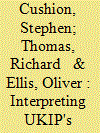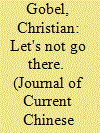| Srl | Item |
| 1 |
ID:
103583


|
|
|
|
|
| Publication |
2011.
|
| Summary/Abstract |
Studies of electoral authoritarianism in Southeast Asia highlight the significance of a compliant media in acting as an obstacle to democratization. Analyses of Malaysian politics are no different. Although the media in Malaysia is largely private, most observers point to the various legislative mechanisms and ownership structures through which compliance is ensured. Although most political scientists have concluded that such mechanisms ensure there is a progovernment bias, there have been few attempts to measure this bias and analyze its impact. With this study, the author aims to begin to fill that gap by studying the degree to which newspapers in Malaysia display partisanship in their coverage of Malaysian politics. To do so, two Malay-language newspapers were selected for coding, using two separate two-week periods as samples. The first period coincided with the March 2008 Malaysian general election, and the second, serving as a control, was from October 2006. Having demonstrated a clear degree of progovernment bias in both newspapers, the author then explores the factors postulated to explain this.
|
|
|
|
|
|
|
|
|
|
|
|
|
|
|
|
| 2 |
ID:
138890


|
|
|
|
|
| Summary/Abstract |
UK broadcasters came under fire for the amount of airtime UKIP and its leader Nigel Farage received after the party won the most votes in the 2014 EU election. Our content analysis of television news during the 2009 and 2014 campaigns found little bias in terms of soundbites, but in the more recent election Farage visually appeared in coverage to a greater degree than other party leaders. Moreover, two core UKIP policies—being in or out of Europe and immigration—dominated coverage in 2014. We suggest the ‘UKIP factor’ and the media's fascination with Nigel Farage help explain why the 2014 campaign was more visible on television news than was the case in 2009 and was largely reported through a Westminster prism. Although television news bulletins attempt to impartially report elections, the 2014 campaign agenda was largely contested on UKIP's ideological terrain and the party's electoral fortunes.
|
|
|
|
|
|
|
|
|
|
|
|
|
|
|
|
| 3 |
ID:
132732


|
|
|
|
|
| Publication |
2014.
|
| Summary/Abstract |
Field research in China often requires the researcher to cooperate with two kinds of actors: research collaborators, such as those at universities or official think tanks, and local officials. These actors facilitate or enhance field access, but such access comes at the price of a potential "pre-selection bias" in data collection. Some scholars have argued that dependence on these "gatekeepers" introduces a significant bias into research outcomes. I argue, however, that the constraints faced by China scholars in their field studies are not absolute, but function by degree. The CCP is monolithic neither in its organization nor in the thoughts of its agents, and close collaboration with local partners can help remove normative bias rather than necessarily introducing it. Most importantly, an argument built exclusively on the power of structural constraints discounts China scholars' most crucial abilities: to learn, to think critically and to research holistically.
|
|
|
|
|
|
|
|
|
|
|
|
|
|
|
|
| 4 |
ID:
142078


|
|
|
|
|
| Summary/Abstract |
We analyze and compare three separate efforts to code bias in Malaysia's media and find strong empirical evidence of an ongoing and profound progovernment bias in coverage. We also find, however, significant variation in bias between different types of news outlets. While Malay and Anglophone sources tended to be strongly progovernment, Chinese-language and online outlets were far more impartial. We demonstrate that both the general bias and the variation in it are largely the result of two factors: (1) government censorship and (2) ownership structures that link many major outlets to the ruling coalition. These findings provide a detailed view of the struggle for media independence in a less-than-democratic regime and supply insight into media bias across both authoritarian and democratic regimes in Asia, as well as outside it.
|
|
|
|
|
|
|
|
|
|
|
|
|
|
|
|